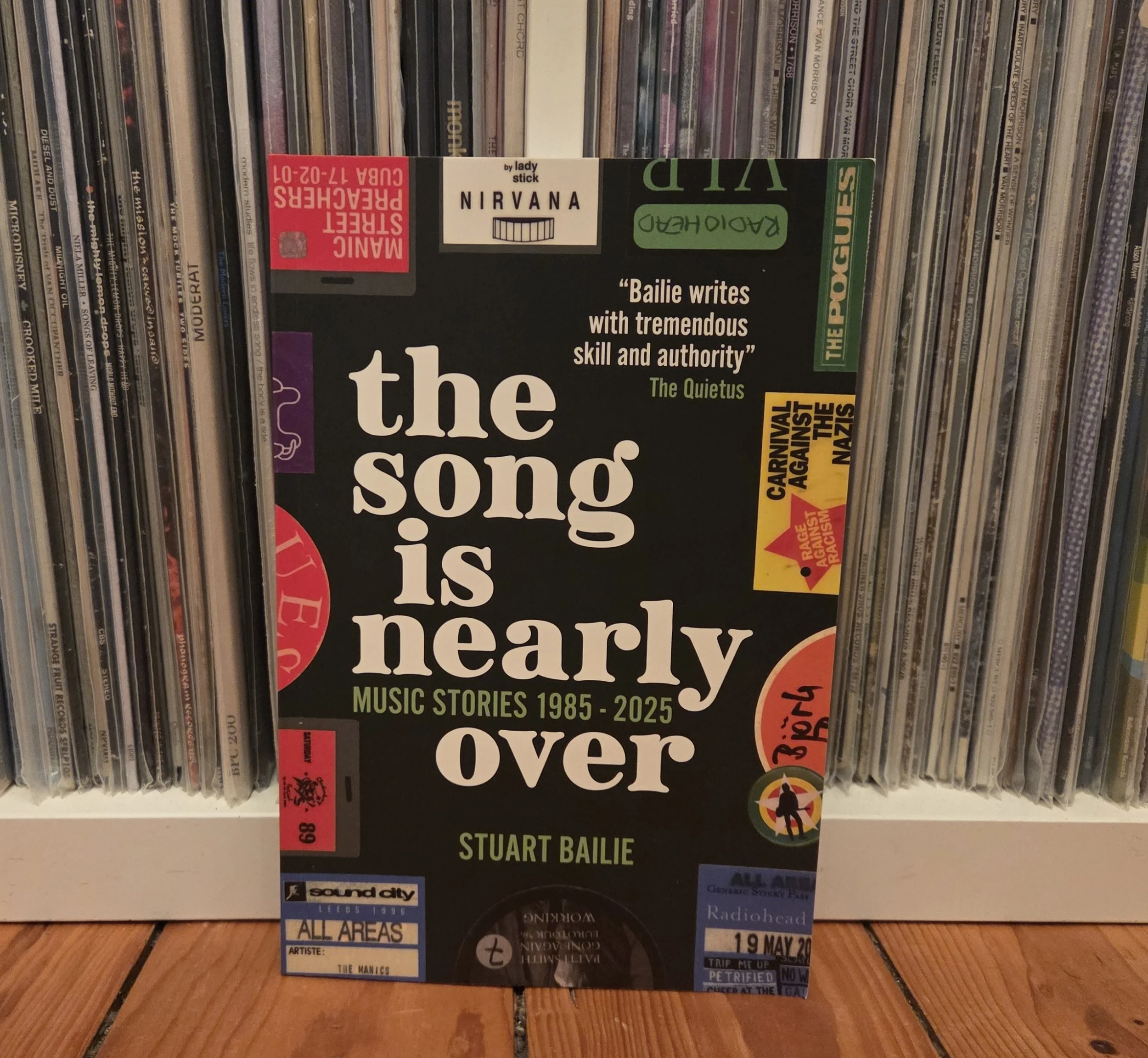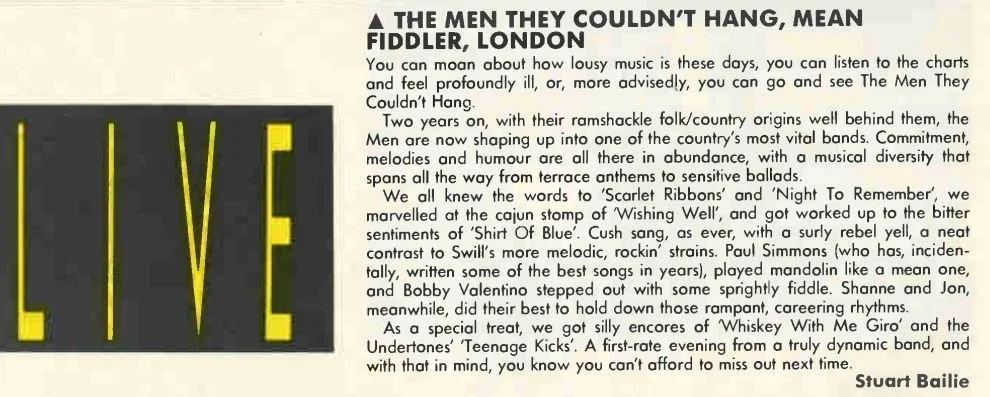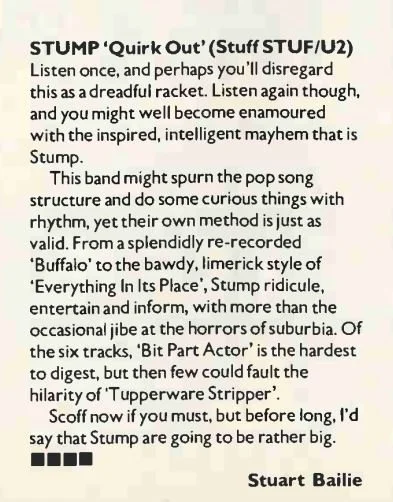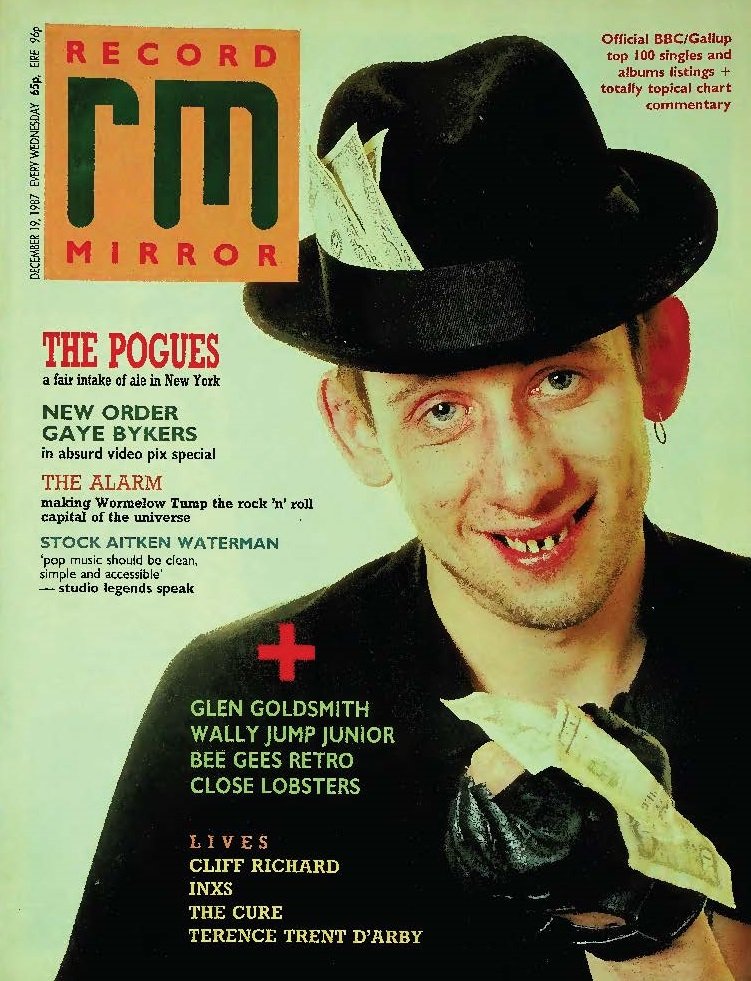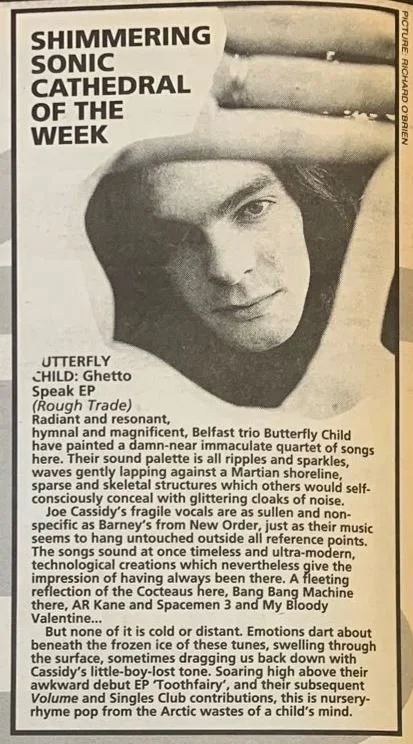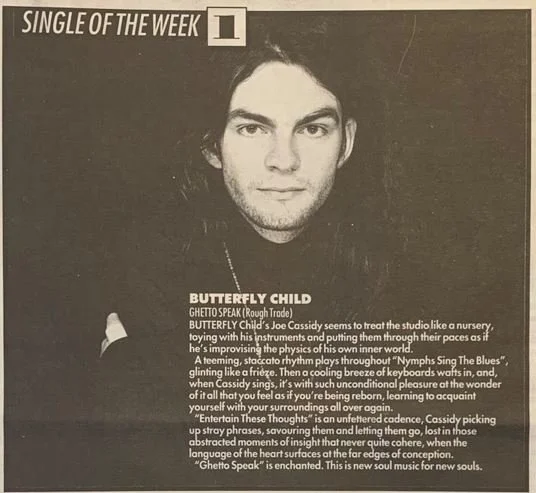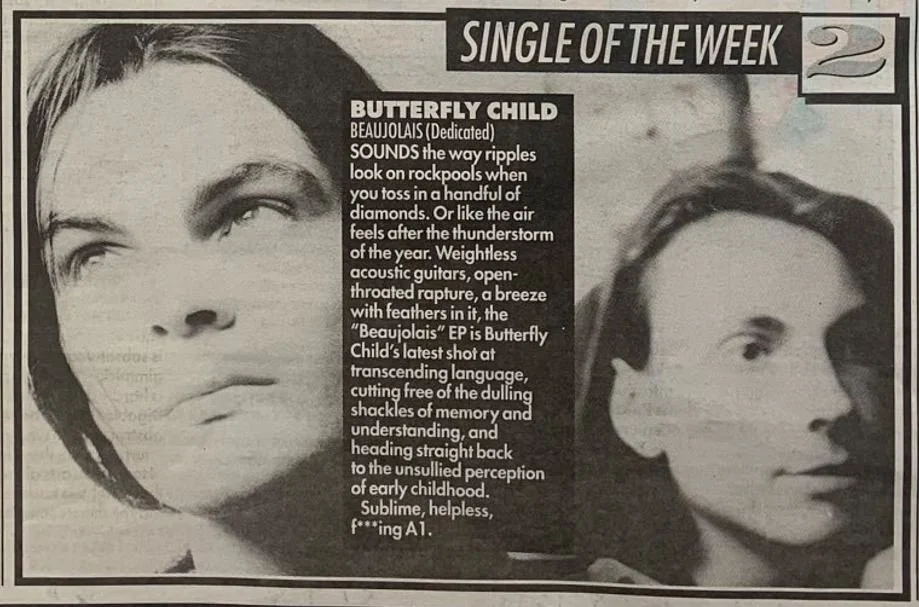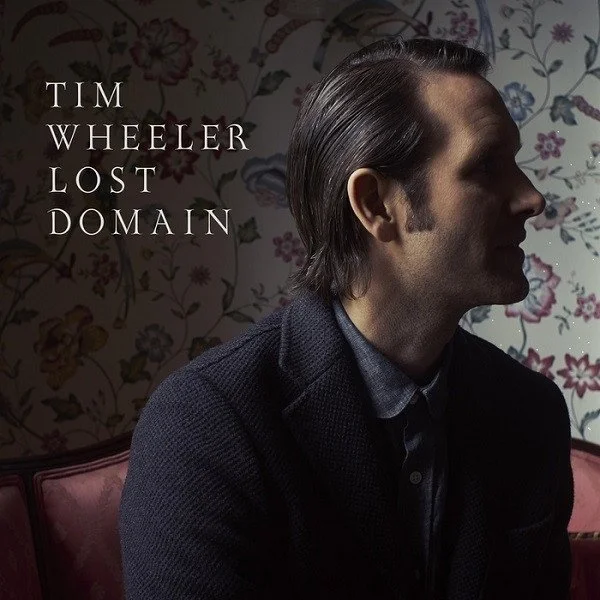Bonus Episode 8
Stuart Bailie
Music journalist and author Stuart Bailie presents 40 years of music stories, his favourite Irish albums and a whole lot more. Photograph of Stuart by Jonah Gardner.
Episode Notes
“I would read the UK Music Press, New Musical Express especially. They were the wise uncles that I never had who would help you. If you liked David Bowie’s “plastic soul”, well maybe you’d want to have a listen to, Earth, Wind & Fire, or The Delfonics. So there was always these voices that were advising you or telling you stuff. So I loved the culture of the music press that could expand your mind and expand your understanding of the world.”
Stuart Bailie in conversation with Paul McDermott
(taken from To Here Knows When - Great Irish Albums Revisited, Bonus Episode 8)
This is a Bonus Episode of the podcast with the music journalist and author Stuart Bailie.
It’s a long episode and over the course of our conversation we chat about: the UK music press of the 80s and 90s; growing up in Belfast during the Troubles; Punk in Northern Ireland; Terri Hooley and Good Vibrations; The Sex Pistols; Rudi; The Clash; The Specials and The Beat in Belfast in 1981; moving to London in the mid-80s; Northern Irish music journalists Barry McIlheney, David Cavanagh, Dave McCullough, Gavin Martin, Carol Clerk and others; Van Morrison and Them; writing for Record Mirror and NME; The Men They Couldn’t Hang and Cowpunk; Radiohead; Manic Street Preachers; Kurt Cobain and Nirvana; Pop Will Eat itself; Tim Wheeler and Ash; Colenso Parade; Primal Scream; Andrew Weatherall; The Waterboys; the 1998 Belfast Concert For Yes Vote; Oh Yeah Music Centre; and a whole lot more.
The Song is Nearly Over: Music Stories 1985-2025 (2025) by Stuart Bailie. Photograph by Paul McDermott.
In the late 70s and early 80s Stuart played in a few bands in his native Belfast (Acme, Family of Noise, The Troubleshooters). He eventually realised that playing in a band wasn’t for him so he sold his guitar and bought a typewriter. Like thousands of others Stuart emigrated to London in the mid-80s and got a steady gig writing for Record Mirror.
After Record Mirror folded he found a home at the NME and eventually worked his way up to becoming the paper’s assistant editor.
I mentioned in my introduction to the Danny Kelly episode (Bonus Episode No. 7), that I started buying the NME in 1989 and continued to purchase it religiously every week for most of the 90s. So I can remember a load of Stuart Bailie reviews and features from the paper: interviews with Primal Scream, Radiohead, Manic Street Preachers, Morrissey, Björk, Tom Waits and loads of others.
Stuart also used the platform he had, with a music paper that sold in excess of 115,000 copies a week, to publish interviews with a load of Irish artists including: Therapy?, Ash, An Emotional Fish, The Black Velvet band, Hothouse Flowers, The Pogues, Jah Wobble and Dolores O’Riordan, Mary Coughlan, Power of Dreams, Energy Orchard and many others.
He travelled to Donegal to meet Moya Brennan and Clannad. He wrote features on The Pogues’ manager Frank Murray. He wrote about David Holmes and the Belfast music scene of the 1990s. He wrote a two-page spread from 1990 titled “Black Velvet: Ireland’s Finest Vinyl” where he guides the reader through some of the greatest Irish albums ever released including records by Planxty, De Danann, Moving Heart, The Chieftains, and Van Morrison.
“Black Velvet” by Stuart Bailie: NME, 02 June, 1990.
Stuart moved back home to Belfast in the late 90s and continued to write about music and pop culture for a variety of publications. In 2018 his book Trouble Songs, the story of music and conflict in Northern Ireland, was published. He has also written books about Van Morrison, Thin Lizzy, and his old friend Terri Hooley.
His latest book is called The Song is Nearly Over: Music Stories 1985-2025. A fantastic compendium of his music journalism. Stuart details encounters with PJ Harvey, Andrew Weatherall, Nick Cave, the infamous “Battle of Britpop” and loads of other stories. It’s an essential book for any music fan, but particularly, if like me, you spent way too much time in the 1990s poring over the weekly music papers. I absolutely loved it.
The book also details how Bono once ended up calling Stuart, “a tough Nordy c**t”. Now, I definitely never thought that the first time I’d have to bleep an expletive on this podcast would be for a Bono quote.
In 2018 when Stuart was doing interviews to promote Trouble Songs he told the British Council - the UK’s international organisation for cultural relations - that music had changed his life in so many ways:
“Listening to The Clash encouraged me to be self-aware at a time when my hometown of Belfast was a sectarian, entrenched city.”
Stuart continued, “Punk nights in town blew away so many myths and the alternative outlook was a valuable gift. It has never left me.”
And thankfully it still hasn’t left him.
The Men They Couldn’t Hang, Mean Fiddler, London by Stuart Bailie. 27 September, 1986 - Record Mirror.
Paul McD: “You forget that The Men They Couldn’t Hang got a lot of press in the mid-80s, didn’t they? I don’t know if they ever sold a lot of records, but they got a lot of press.”
Stuart Bailie: “Well, if you look back over the NME independent charts, their version of ‘The Greenfields of France’ was No. 1 for about 6 months. There was a scene in London which got called Cowpunk. It was back to basics, 30s, 40s, blues, skiffle, country music, and Irish. The Pogues were part of that, The Boothill Foot Tappers, The Skiff Skats, The Shillelagh Sisters. It was me and a bunch of pals from Belfast, and that was where we kind of hung out in North London, in little bars, and Billy Bragg was on the sort of fringes of it.”
Stuart Bailie in conversation with Paul McDermott
(taken from To Here Knows When - Great Irish Albums Revisited, Bonus Episode 8)
Stump - Quirk Out by Stuart Bailie. 08 November, 1986 - Record Mirror.
“I got to know a lot of the NME people socially, and they were watching what I did. Ironically, they were reading things like my Mel & Kim interview at Record Mirror, and they were going, “this guy can write about pop music, and he can do other stuff”. I wanted to impress them by writing about Stump, The Soup Dragons, and Talluhlah Gosh.”
Stuart Bailie in conversation with Paul McDermott
(taken from To Here Knows When - Great Irish Albums Revisited, Bonus Episode 8)
Rudi
The Band That Time Forgot
2002, Last Year’s Youth Records
“Sadly, they didn’t release an album in their time. This is a retrospective.” Stuart Bailie
Photograph of Stuart by Jonah Gardner.
“Punk bands like Rudi and later on The Outcasts and Stiff Little Fingers - the Belfast acts that were kind of fearless - and in Derry you had The Undertones and later The Moondogs. All of a sudden you didn’t need anyone to green light what you were about.
Rudi were a great pop band, but they were a punk band. Brian Young [guitar and vocals] was a couple of years ahead of me at school, so I watched him evolve from afar. And he had the haircut and the slouch, and he would carry the records under his arm.
First of all, he was interested in KISS and Glam Rock and Marc Bolan, and then he discovered the Ramones. I think I first saw them very early in ‘78, maybe January or February, and they had boiler suits on with words all over them, very Clash. They were an astounding band, and they just were always in the wrong place at the wrong time, never signed the big record deal, never got a proper album out, but really enthralling.”
Stuart Bailie in conversation with Paul McDermott
(taken from To Here Knows When - Great Irish Albums Revisited, Bonus Episode 8)
Van Morrison
TB Sheets
1973, Bang Records
“Cobbled together Bang recordings, including the first version of ‘Madame George’, some of his music will be in my heart forever.” Stuart Bailie
“After Them broke up, Van started to do stuff with Bert Burns, who was a pop soul producer, and the big tune that came out of that was ‘Brown Eyed Girl’. But also, Van is kind of looking around for thoughts, ideas, riffs, and the track ‘TB sheets’ is about listening to a girl, a friend dying of TB. He’s been very honest in the song going, well I feel sorry that you’re dying, but I don’t know if I should be here. It’s very dark, I always compare it to Picasso’s blue period. Everything’s poor, messy, and degraded. And out of that is the first version of ‘Madame George’ and Bert Burns records it and puts party sounds on.
Cissy Houston and the Sweet Inspirations are doing backing vocals. It’s obviously much rougher than the version on Astral Weeks. But I heard the Bang version first on the TB Sheets record, and I just couldn’t believe it. The ambition of that song, this is someone who’s 22, maybe 21, who wants to write a song about someone playing dominoes in drag.
The Bang version is more graphic about what seem to be rent boys who are hanging around with gold cigarette lighters. So, the confidence to be able to put Belfast in a brilliant popular song, which he’d already done with the story of Them. So, all of that kind of blew my mind.”
Stuart Bailie in conversation with Paul McDermott
(taken from To Here Knows When - Great Irish Albums Revisited, Bonus Episode 8)
The Pogues
Rum Sodomy & the Lash
1985, Stiff Records
“It was a period of high immigration because of economic problems in Ireland. A lot of very lonely Irish people, and Shane and The Pogues almost gave them something to gather around.”
Stuart Bailie
“There was a lot of messed up, lonely, lonesome people, and Shane McGowan was our patron St. [Rum Sodomy & the Lash] made you realise you were an immigrant and you weren’t the only one, so that was important. Much as my life in the middle 80s to late 80s was just non-stop fun, occasionally, you would get cut off at the knees by homesickness, the whiskey came out, and you would play a bit of Shane McGowan, or you would suddenly find these levels of meaning in Van Morrison records.”
Stuart Bailie in conversation with Paul McDermott
(taken from To Here Knows When - Great Irish Albums Revisited, Bonus Episode 8)
Record Mirror: 19 December, 1987. Stuart’s Pogues cover story is reproduced in The Song is Nearly Over.
Colenso Parade
Glentoran
1986, Fire Records
“Northern melancholia featuring Terry Bickers.” Stuart Bailie
Photograph of Stuart by Jonah Gardner.
“The student area of Belfast is called the Holyland because there’s a Damascus Street and a Palestine Street and Colenso Parade. Colenso is something to do with the Boer War, and “Empire”, these things are just under the surface. Oscar [Thomas “Oscar” Askin – vocals] and Linda [Linda Clandinning – keyboards] were the two people who were at the centre of Colenso Parade. They were both from Portadown in Armagh. Oscar looked a little bit like Ian McCulloch, and he was friends with Ian McCulloch and Pete Wylie, and he had tousled spiky hair. When I was watching them at places like the Rock Garden and Covent Garden their guitarist was Terry Bickers, who later went off to play with The House of Love. I spent a lot of time with Oscar. The melancholia of Irish music, he was listening to the ballads that Van Morrison was doing when he was with Them.”
Stuart Bailie in conversation with Paul McDermott
(taken from To Here Knows When - Great Irish Albums Revisited, Bonus Episode 8)
‘Fontana Eyes’ by Colenso Parade reviewed by Stuart Bailie: 02 October, 1986 - Record Mirror.
Colenso Parade interviewed by Stuart Bailie: 01 November, 1986 - Record Mirror.
Unfortunately we never got around to talking about some of Stuart’s other favourite Irish albums. I’ve included a few of them below with some short notes from Stuart:
Energy Orchard
Energy Orchard
1990, MCA Records
“Energy Orchard’s debut album, Bap Kennedy finding his voice.” Stuart Bailie
“There was a colony of Belfast acts who moved to London or got busy in London. Ruefrex would have been one of them. Energy Orchard, who were a West Belfast band, Bab Kennedy was the singer, and they ended up in North London. They had a residency at the New Pegasus, which was owned by one of either Chas or Dave out of Chas & Dave.”
Stuart Bailie in conversation with Paul McDermott
(taken from To Here Knows When - Great Irish Albums Revisited, Bonus Episode 8)
In January 1990 Stuart interviewed Energy Orchard in the pages of the NME. The feature was headlined “Louder than Bombs” (no doubt the work of an NME sub-editor) and was bookended by the following two paragraphs.
“Welcome to Energy Orchard, prodigal sons of Belfast and prime testifiers from this vital, messed-up part of of the world. A band with guts, humour and - fair play to them - a brave manifesto for the future.”
“In 1989, just over 60 people were killed in sectarian incidents here. That’s not a good record, but as the third lowest tally since 1970, it leaves us with some reason to be optimistic. It’s been a painful, vacant haul from ‘Alternative Ulster’ to ‘Church of Energy’, but suddenly, quite fantastically, life’s looking pretty sweet. And it couldn’t to a nicer place.”
Stuart Bailie: 27 January, 1990 - NME
That final paragraph, though optimistic, is a particularly stark read and highlights just how far we’ve come since the signing of the Good Friday Agreement.
Butterfly Child
Soft Explosives
1998, HitIt! Recordings
“Joe Cassidy was so great, ‘Drunk on Beauty’ is so lovely.” Stuart Bailie
Butterfly Child was a Northern Irish group led by Joe Cassidy who released four full-length albums. Onomatopoeia, the band’s 1993 debut album, was released on Rough Trade Records and The Honeymoon Suite, its 1994 follow-up, was released on Dedicated Records. Stuart picks Soft Explosives, Cassidy’s third album under the Butterfly Child moniker, as one of his favourite Irish albums.
Butterfly Child received loads of great press in both the NME and Melody Maker in the early to mid-90s (I’ve included a few examples below) but just never seemed to make a break through. Cassidy moved to Chicago and sadly passed away in 2021 from heart problems. He was only 51.
In his Belfast Telegraph obituary (“Remembering Joe Cassidy: North Belfast musician’s death at 51 robs us of a unique talent”) Stuart wrote:
“On Joe Cassidy’s very first day in New York, a bearded man came over and invited him to a party. It was the poet Allen Ginsberg and a few hours later the Belfast boy was Allen’s guest at a Manhattan loft, alongside Debbie Harry, Lou Reed and Patti Smith.
This was a classic example of the Joe Cassidy aura. He had an excess of charm and a magnificent smile. Things seemed to happen around him. Wynona Ryder came into his orbit when she clipped him in the street with her car. The David Bowie encounter happened around a backstage fruit table. Words were exchanged and Joe was hugely taken by the scent of the Thin White Duke.
In recent years, Joe was living in Chicago, putting out great records and befriending the families of Glen Campbell and his songwriting partner Jimmy Webb. At one point, he was working in the studio with Jimmy while Glen, suffering from dementia, watched intently.”
In his Chicago Reader obituary (“Mourning Joe Cassidy of Butterfly Child”) Steve Krakow wrote:
“Onomatopoeia, was a modestly budgeted production that nonetheless created an entire alternate universe of lush, immersive tunes. (Cassidy adeptly described his sound as “big intimacy.”) His bandmates in Butterfly Child came and went, and the name came to be synonymous with Cassidy himself, kind of like “T. Rex” turned into shorthand for “Marc Bolan.” Cassidy was tired of hassles with his various UK labels, so he jumped at the chance when Chicago-based HitIt! Recordings, which had licensed Butterfly Child in the States, invited him here to make use of a studio in 1997. “I just fell in love with Chicago,” he recalled in a 2015 interview for XS Noize. “I recorded eight tracks in a week, and then the label asked if I wanted to make an album. So I went back, and stayed for ten years! I’ve always gone where the chance to make music has been afforded to me.”
A compilation of Butterfly Child’s entire recorded output, including a few tracks from the Soft Explosives album, can be heard below.
Butterfly Child - ‘Ghetto Speak’ by Stephen Dalton. 14 August 1993 - NME.
Butterfly Child - ‘Ghetto Speak’ by Jon Selzer. 24 July 1993 - Melody Maker.
Butterfly Child - ‘Beaujolais’ by Taylor Parkes. 05 November, 1994 - Melody Maker.
Tim Wheeler
Lost Domain
2014, Atomic Heart Records
“Tim singing about his dad’s dementia. Astounding.” Stuart Bailie
One of the standout tracks on the album is ‘Medicine’, here’s how Wheeler described the song:
“This was a very hard song to write. It’s about my dad’s time in the dementia ward. He was paranoid all the time and trying to figure out how to get out of there. I was trying to understand what he was going through. It’s based around the same repetitive chord sequence, but I wanted to keep it interesting and for it to capture the kind of mood swings he would go through. One moment he’d be elated and the next he’d be crushed. At one point they had a piano in the ward and I sat down with him one day. We played this kind of weird, sparse, almost ambient music. There’s a tiny bit of the recording of that in the song.”
Lost Domain can be heard below.
For Further Reading/Listening:
Stuart’s books - The Song is Nearly Over: Music Stories 1985-2025 (2025), Terri Hooley: Seventy-Five Revolutions (2023), 75 Van Songs: Into the Van Morrison Songbook (2020), Trouble Songs: Music and Conflict in Northern Ireland (2018) - are all available to purchase on Bandcamp.
Stuart has created a Spotify playlist to accompany 75 Van Songs: Into the Van Morrison Songbook.

